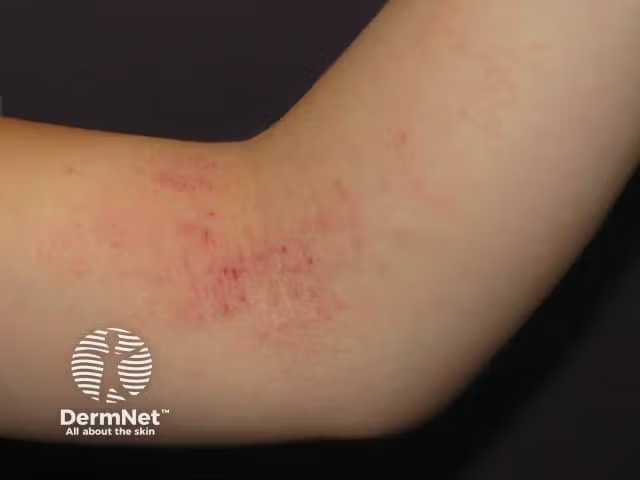
- Case-Based Roundtable
- General Dermatology
- Eczema
- Chronic Hand Eczema
- Alopecia
- Aesthetics
- Vitiligo
- COVID-19
- Actinic Keratosis
- Precision Medicine and Biologics
- Rare Disease
- Wound Care
- Rosacea
- Psoriasis
- Psoriatic Arthritis
- Atopic Dermatitis
- Melasma
- NP and PA
- Skin Cancer
- Hidradenitis Suppurativa
- Drug Watch
- Pigmentary Disorders
- Acne
- Pediatric Dermatology
- Practice Management
- Prurigo Nodularis
- Buy-and-Bill
Opinion
Video
Engaging in Shared Decision-Making
Author(s):
Brad Glick, DO, MPH, emphasizes the importance of personalized and inclusive communication in choosing therapeutics for atopic dermatitis.
EP: 1.Evaluating Functionality in Hand-Foot Atopic Dermatitis
EP: 2.Diversity in Clinical Trials
EP: 3.Investigating Hand-Foot Atopic Dermatitis
EP: 4.Adolescents Versus Adults: Considerations for Hand-Foot Atopic Dermatitis
EP: 5.Staying Solutions-Oriented With AD Solutions
EP: 6.Top Considerations From Latest AAD AD Guidelines
EP: 7.Delving Into the Nitty Gritty of AD Nomenclature
EP: 8.Engaging in Shared Decision-Making
EP: 9.Lifestyle Factors Influencing Treatment Plans
EP: 10.Addressing Research Gaps in the AAD AD Guidelines
EP: 11.Acknowledging Opportunities for Further Research in AD Management
EP: 12.New AAD Atopic Dermatitis Guidelines and Dupilumab Label Updates
In the Dermatology Times Expert Perspectives series "Advancements in Atopic Dermatitis: Insights from the 2024 Masterclasses in Dermatology Conference," leading dermatologists discuss the advancements in treatments and data for atopic dermatitis (AD) with hand-foot involvement, diversity in clinical trials, and pearls from the American Academy of Dermatology's (AAD) AD treatment guidelines.
In this episode, Brad Glick, DO, MPH, of the Glick Skin Institute in Margate and Wellington, Florida, emphasizes the importance of personalized and inclusive communication in choosing therapeutics for atopic dermatitis. He highlights the need to consider patient preferences and circumstances, involving both patients and parents in the decision-making process, utilizing educational materials, and the importance of handwritten instructions, to reinforce patient understanding and engagement.
Episode Transcript
Glick: I think that choosing therapeutics for AD these days, since we've gone from having almost nothing in the toolbox to so many different therapeutics in the toolbox, a lot really has to do with first of all the the age of the patient--who is the individual we're treating? If it's a child or an adolescent, we have to really include the parent in the conversation, but I think it's about inclusivity of conversation. What is it that the patient wants? What is it that the child needs in their circumstances? Is it a topical therapy? Is it an oral systemic therapy? Are we thinking biologic? And is it going to be an injectable therapy?
What we do in our practice, which is really interesting, is we've created a take home, if you will, a 1-pager I like to call it, which is instructive. It's not only their plan, but it collaborates between our recommendations and what the individual, whether it is the adult patient or as a child or an adolescent, is really agreeing to. Because we've talked about it collaboratively, it takes a little bit of extra time. But one of the nice things is that the patients or the parents go ahead and sign it, and then we know what we've discussed has all been shared. You know, we have a limited amount of time in the in the exam room.
First of all, it takes a team having educational materials are crucial and particularly for AD. You know, when I speak on this subject, I'll put up a few different pictures of treatment plans. Many universities have treatment plans, but many of us have handwritten plans, educational, impactful brochures, if you will. The American Academy of Dermatology has fantastic AD, brochures and of course many others. But what are the last pictures that I'll show when I'm doing a talk on AD is just handwritten instructions, confirmation of the education that we're providing in the office in the clinic. It takes a little bit of extra time but not much and it's worth it because it translates, in my opinion, to really positive outcomes. And so that's actually how we educate. And then we actually write down that education and so some of it is collaborative with vehicles that we have that are, you know, known educational vehicles, but I like writing out individualized treatment plans, and it couldn't be more important in a condition like AD, and I think that embodies shared decision making.
Transcript edited for clarity
2 Commerce Drive
Cranbury, NJ 08512
All rights reserved.





